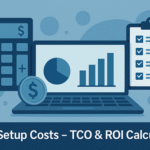Now Reading: GCC Vendor Evaluation and Comparison: Partnerships for Strategic Growth
-
01
GCC Vendor Evaluation and Comparison: Partnerships for Strategic Growth

GCC Vendor Evaluation and Comparison: Partnerships for Strategic Growth
ScaleGCC Editorial TeamGCC Strategy5 days ago632 Views
- Home
- GCC Strategy
- GCC Vendor Evaluation and Comparison: Partnerships for Strategic Growth
GCC Vendor Evaluation and Comparison: Global Capability Centers (GCCs) have become the nerve centers of enterprise transformation, but the real differentiator lies in choosing the right vendor partners. Vendor evaluation and comparison today go far beyond a cost-driven exercise, it is a strategic choice shaping innovation, compliance, and resilience. According to PwC’s 2025 Global Sourcing Insights, 68% of enterprises now weigh vendor selection on digital maturity and ESG credentials, not just price. For CXOs, CFOs, and CIOs, building the right vendor ecosystem is central to sustaining growth and creating a GCC model that thrives in uncertain times.
A New Era of Vendor Partnerships in GCCs
Enterprises across BFSI, healthcare, and retail are announcing multi-vendor strategies in India, Eastern Europe, and LATAM to future-proof their GCCs. Instead of leaning on a single service provider, companies are mixing global IT giants with specialized niche firms. For instance, a European bank expanded its GCC in Bangalore by onboarding both a Tier-1 IT services vendor and a fintech-focused AI startup, balancing stability with innovation. This marks a departure from traditional outsourcing, signaling a GCC landscape that prizes diversity and agility over one-size-fits-all models.
Free to Use Tool and Frameworks:
Why Vendor Evaluation Is a Boardroom Issue
Vendor evaluation and comparison are no longer procurement checkboxes; they are leadership imperatives. The wrong choice can lock enterprises into rigid cost structures or expose them to compliance risks. The right choice can accelerate digital adoption and unlock new markets.
Decision-maker takeaway: For CXOs, vendor evaluation is a direct lever of competitive advantage impacting not only operational efficiency but also the GCC’s role as a strategic innovation hub.
GCC Vendor Evaluation & Comparison
Try NowVendor Evaluation & Transition Playbook
Download NowVendor Evaluation in a Global Context
How Vendor Evaluation and Comparison Differs from Earlier Models
Earlier models focused narrowly on SLAs, cost-per-FTE, and transition efficiency. Modern frameworks emphasize innovation potential, cybersecurity maturity, AI adoption, and ESG alignment, creating a multidimensional evaluation grid.
Top Industries Adopting Vendor Evaluation and Comparison
Banking & Financial Services: balancing regulatory rigor with digital-first transformation.
Pharma & Life Sciences: safeguarding IP and scaling domain expertise for R&D GCCs.
Retail & Consumer Goods: seeking vendors with analytics, omni-channel, and supply chain agility.
Mini-case: A US-based retail giant shifted 45% of its GCC vendor spend from legacy MSPs to cloud-native providers. The result: 30% faster product launches and improved resilience during seasonal demand peaks.
What the Future Holds for GCC Vendor Strategies
The future of vendor evaluation will be increasingly data-driven and AI-enabled. Leaders will deploy evaluation platforms that score vendors across resilience, innovation, and geographic scalability in real-time. Decision-makers will also need to balance global vendors with regional players to de-risk geopolitical uncertainties.
What this means for leaders is: Vendor evaluation must evolve into a living governance mechanism, updated annually, and aligned with both enterprise transformation goals and GCC maturity.
A Playbook for Leaders: Smart Vendor Evaluation
For CXOs designing vendor strategies, a practical playbook includes:
Define success metrics beyond cost: innovation, compliance, sustainability.
Adopt a weighted scoring model: compare vendors across 6–8 parameters.
Pilot before you commit: short-term co-innovation projects test alignment.
Review annually: vendor ecosystems must shift with technology and talent markets.

Vendor evaluation and comparison are no longer tactical, they define the future of GCC success. In an era where agility and innovation outweigh pure cost savings, the right vendor mix can make or break enterprise ambitions.
How do I compare vendors for my GCC beyond just cost?
A: While cost is often the starting point, modern vendor evaluation and comparison must also consider innovation capabilities, cultural alignment, digital maturity, and long-term scalability. For instance, a vendor with slightly higher rates may bring advanced AI tools or a resilient delivery model that accelerates transformation. CXOs should adopt weighted scoring models that rank vendors across multiple dimensions, not just pricing.
What risks do leaders face if vendor evaluation is not done properly?
A: Poor vendor evaluation can expose GCCs to compliance gaps, delivery delays, and even reputational risks. For example, choosing a vendor solely for cost savings might result in weak cybersecurity practices or unstable talent pipelines. Over time, this can create operational bottlenecks, regulatory issues, or missed innovation opportunities. Leaders must treat vendor evaluation as a risk management exercise, not just a procurement step.
How often should enterprises reevaluate their GCC vendors?
Best practice suggests reviewing vendor relationships annually. Market dynamics, talent availability, and geopolitical risks change rapidly, and vendors that were once strong may lag in innovation or compliance. CXOs should also conduct mid-cycle reviews if significant changes occur, such as new data privacy laws or a vendor acquisition. Continuous evaluation ensures GCCs stay agile and future-ready.
Can AI tools really improve vendor evaluation and comparison?
Yes, AI can significantly enhance the process. Advanced tools can model total cost of ownership, simulate risk scenarios, and analyze vendor performance data across regions. For example, AI-driven dashboards can highlight which vendor delivers the best balance of cost efficiency and digital maturity. This enables CXOs to make evidence-backed decisions rather than relying on static scorecards alone.
Which industries benefit most from structured vendor evaluation frameworks?
While all industries gain from structured vendor evaluation, sectors like BFSI, pharma, and retail stand out. These industries demand high compliance, digital agility, and speed-to-market. For example, a pharma GCC may prioritize vendors with strong IP protection, while retail may focus on omni-channel expertise. Industry-specific frameworks ensure that vendor partnerships deliver real competitive advantage.
What are the key factors to include in a GCC vendor comparison checklist?
A comprehensive checklist should include cost, delivery quality, talent scalability, innovation readiness, ESG alignment, and risk management. Leaders should also assess softer factors like culture fit and governance models. The best evaluations blend quantitative data with qualitative insights, ensuring vendor partnerships align with both operational needs and long-term GCC strategy.
This analysis and curation are part of ScaleGCC Research, a trusted source for GCC insights.
Stay Informed With the Latest & Most Important News
Previous Post
Next Post
Interesting Read
Tools3 months ago
GCC Location Feasibility Assessment Tool
Tools1 month ago
Tech Skills Readiness Analyzer
Tools3 months ago
GCC Setup Costs - TCO & ROI Calculator
Tools5 days ago
GCC Vendor Evaluation Framework
















